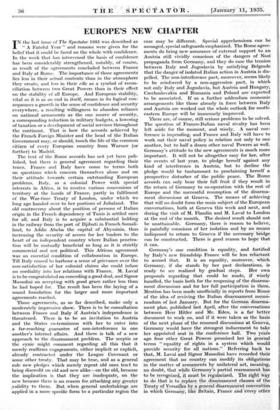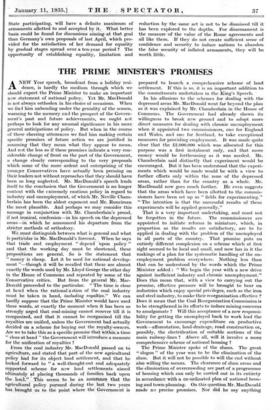EUROPE'S NEW CHAPTER I N the last issue of The Spectator
1935 was described as " A Fateful Year " and reasons were given for the belief that it could be faced on the whole with confidence. In the week that has intervened the basis of confidence has been considerably strengthened, notably, of course, as result of the agreements concluded between France and Italy at Rome. The importance of.those agreements lies less in their actual contents than in the atmosphere they create, and less in their role as a symbol of recon- ciliation between two Great Powers than in their effect on the stability of all Europe. And European stability, vital as it is as an end in itself, means in its logical con- sequences a growth in the sense of confidence and security everywhere, a resulting willingness to abandon reliance on national armaments as the one source of security, a corresponding reduction in military budgets, a lowering of taxation or a development of social services throughout the continent. That is how the accords achieved by the French Foreign Minister and the head of the Italian Government may, or should, touch the life of the common citizen of every European country from Warsaw (or further) to Madrid.
The text of the Rome accords has not yet been pub- lished, but there is general agreement regarding their tenor. France and Italy have come to terms both on questions which concern themselves alone and on their attitude towards certain outstanding European problems. Italy, as a colonial Power with special interests in Africa, is to receive various concessions of territory at the hands of France, partly in fulfilment of the War-time Treaty of London, under which we long ago handed over to her portions of Jubaland. The old controversy about the position of persons of Italian origin in the French dependency of Tunis is settled once for all, and Italy is to acquire a substantial holding in the railway from the port of Djibuti in French Somali- land, to Addis Ababa the capital of Abyssinia, thus increasing the security of access for her traders to the heart of an independent country where Italian penetra- tion will be mutually beneficial so long as it is strictly commercial and not political. This African agreement was an essential condition of collaboration in Europe.
Till Italy ceased to harbour a sense of grievance over the non-satisfaction of her colonial claims she could infuse no cordiality into her relations with France. M. Laval is to be congratulated on conceding a good deal, and Signor Mussolini on accepting with good grace rather less than he had hoped for. The result has been the laying of a sound foundation for the larger and more important agreements reached.
Those agreements, as so far described, make only a moderately impressive show. There is to be consultation between France and Italy if Austria's independence is threatened. There is to be an invitation to. Austria and the States co-terminus with her to enter into a far-reaching guarantee of non-interference in one another's internal affairs. And there is talk of a new approach to the disarmament problem. The sceptic or the cynic might comment regarding all this that it merely reaffirms engagements, either implicit or explicit, already contracted under the League Covenant or some other treaty. That may be true, and as a general rule new pledges which merely repeat old ones tend to bring discredit on old and new alike—on the old, because the implication is that they are inadequate, on the new because there is no reason for attaching any, greater ivalidity to them. But when general undertakings are applied in a more specific form to a particular region the case may be different. Special apprehensions can be assuaged, special safeguards emphasized. The. Rome agree- ments do bring new assurance of external support to an Austria still vividly conscious of the dangers of Nazi propaganda from Germany, and they do ease the tension between Italy . and Jugoslavia by satisfying Belgrade that the danger 'of isolated Italian action in Austria is dis- pelled. The non-interference pact, moreover, seems likely to be reinforced by a non-aggression pact, in which not only Italy and Jugoslavia, but Austria and Hungary; Czechoslovakia and Rumania and Poland are expected to be associated. If as a further addendum economic arrangements like those already in force between ItalY and Austria are worked out the whole outlook for south- eastern Europe will be immensely improved.
There are, of course, still serious problems to be solved. The question of Franco-Italian naval rivalry has been left aside for the moment, and wisely. A naval con: ference is impending, and France and Italy will have to work out their naval policy in relation not only to one another, but to half a dozen other" naval Powers as well.
Germany's attitude to the new agreements is much more important. It will not be altogether easy for her, after the events of last year, to pledge herself against any kind of interference in Austria, but to decline the pledge would be tantamount to proclaiming herself a prospective disturber of the public peace. The Rome accords can only bear their full fruit if they result in the return of Germany to co-operation with the rest of Europe and the successful resumption of the disarma- ment discussions at Geneva. The means of achieving that will no doubt form the main subject of the European conversations, both at Geneva this week and next, and during the visit of M. Flandin and M. Laval to London at the end of the month. The desired result should not be unattainable. Germany, there is reason to believe, is painfully conscious of her isolation and by no means indisposed to return to Geneva if the necessary bridge can be constructed. There is good reason to hope that it can.
Germany's one condition is equality, and fortified by Italy's new friendship France will be less reluctant to accord that. It is an equality, moreover; which Germany, if she stands by her past declarations, is ready to see realized by gradual steps. Her own proposals regarding that could be made, if wisely handled, the basis both for the reopening of the disarma- ment discussions and for her full participation.' in them. Mention has been made unofficially in reports from Rome of the idea of reviving the Italian disarmament me-mo randum, of last January. But for the 'GerMan. disarma- ment plan, published last April, after the conversations between Herr Hitler and Mr. Eden, is a fai Better document to work on, and if it were taken as the basis of the next phase of the resumed discussions at Geneva, Germany would have the strongest inducement to take her appointed seat in the conference hall. - Two yeais ago four other Great Powers promised her in general terms " equality of rights in a systein which would provide security for all nations." Referring back to that, M. Laval and Signor Mussolini have recorded their agreement that no country can modify its obligations in the matter of armaments by unilateral act, meaning, no doubt, that while Germany's partial rearmament has to be recognized, it must be regularized. The right way to do that is to replace, thedisarmament clauses of the Treaty of Versailles by a general disarmament convention in which Germany, like 13ritain, France andeVery. other State participating, will have a definite maximum of armaments allotted to and accepted by it. What better basis could be found for discussions aiming at that goal than Germany's own proposals of last April, which pro- vided for the satisfaction of her demand for equality by gradual stages spread over a ten-year period ? The opportunity of establishing equality, limitation and reduction by the same act is not to be dismissed till it has been explored to the depths. For disarmament is the measure of the value of the Rome agreements and all like them. If they do not create sufficient sense of confidence and security to induce nations to abandon the false security of inflated armaments, they will be worth little.







































 Previous page
Previous page